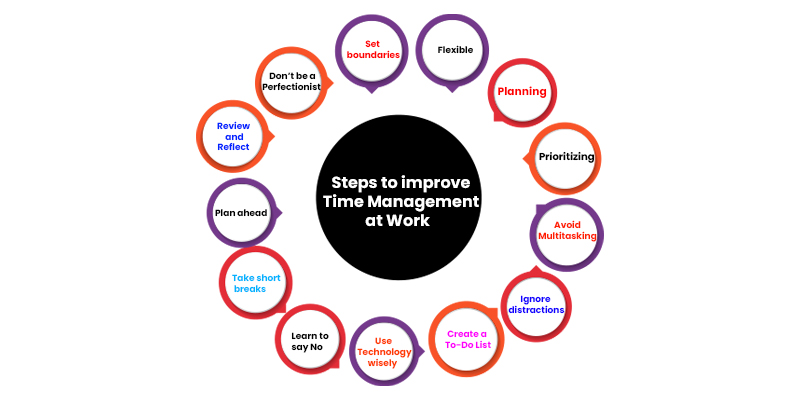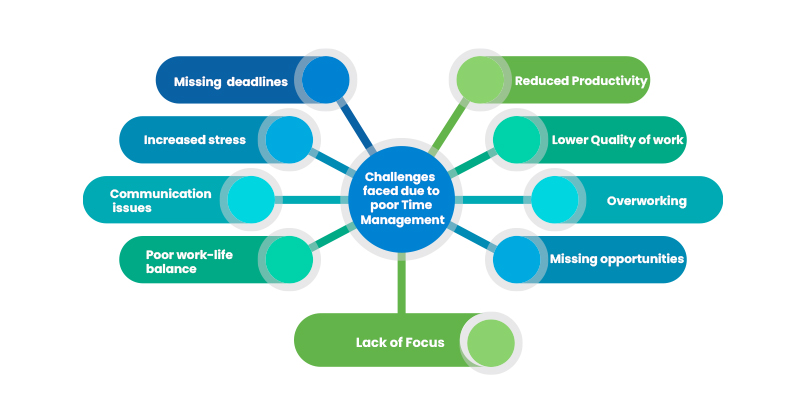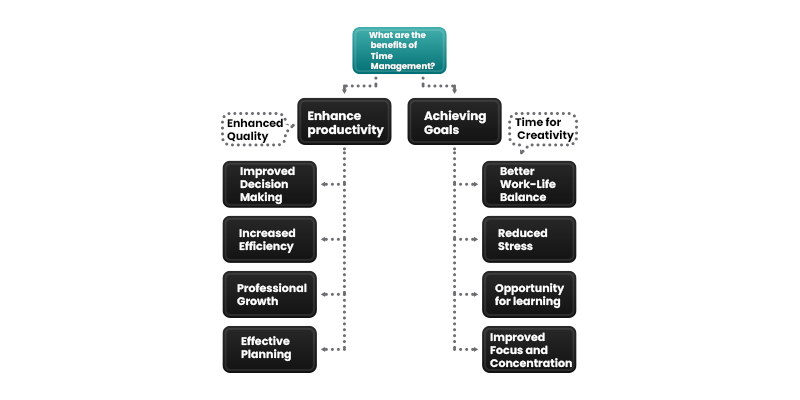There are a lot of factors that affect us when it comes to work. One of those crucial factors is Time. In today’s professional environment, it is not easy to manage your schedule as planned. Mastering the art of Time management is a critical factor in a successful professional life. So in this blog, we will delve into what is time management, its importance, benefits, and tips for candidates seeking freshers jobs to improve Time management skills.

What Is Time Management?
Time management is defined as a practice of planning and organizing activities, and responsibilities that allows individuals to make use of their time more efficiently. It involves scheduling specific tasks, setting priorities, etc. This aspect not only involves the completion of tasks on time, but also ensuring that the tasks are completed in a way that increases productivity, reduces stress, and maintains a peaceful and healthy professional-life balance.
Importance Of Time Management
Importance of time management depends on its ability of how it increase productivity, improves focus, improve quality, helps you in better decision making, reduce stress, helps you to achieve your goal, balance your work-life, maximize your opportunities, enhance creativity, improves flexibility, improve communication, improve personal well-being, and enhance professional growth. Enhancing your time management at work allows you to accomplish your goals with less effort and more effective strategies.
Steps To Improve Time Management At Work
- Planning: Planning plays a critical role in Time management, You can utilize your time wisely only if it is thoroughly planned. Planning doesn’t involve any strict routines. Instead, it involves making the right decisions of knowing how to use the time to complete an activity or a task.
- Prioritizing: Prioritizing your important task is the crucial factor in Time Management. Generally, individuals start their day with the least important work which can be done easily later. Prioritization helps you to differentiate which task is the most important and which one is the least.
- Avoid Multitasking: Multitasking results in a huge waste of time. If you do multiple tasks at the same time, the outcome will be very poor. The proper way to utilize the time is by taking up one task at a time and completing it perfectly before jumping to another one.
- Ignore distractions: The key factor that affects time management is distractions. Nowadays we have a lot of distractions around us such as social media, mobile phones, etc. Spend time to avoid distractions while you are working. If you think that social media is distracting you from working, then it is better to set a separate schedule or time to use social media. By this, you can work without any distractions.
- Create a To-Do List: One of the best tips to save time is creating To-Do Lists. Fix your work schedule accordingly for a day, week, and month. Crossing off completed tasks provides a sense of accomplishment and keeps you organized.
- Use Technology wisely: Technology has grown beyond our expectations. Make good use of it to avoid wasting time. Use reminders, time tracking softwares or apps for task management.
- Learn to say No: Politely say no and decline tasks or activities that are not in your priority list and tasks which don’t align with your schedule.
- Take short breaks: Taking breaks will prevent you from getting stressed. Take a short break whenever needed and plan accordingly to complete the task. This will help you to not get tired so easily.
- Plan ahead: At the end of the day, spend some time fixing the schedule for the next day. This will help you to stay focused and get ready for the next day’s tasks.
- Review and Reflect: Regularly review the tasks done at the end of the day. This will help you to notice and identify your mistakes, so that you can avoid doing them next time.
- Don’t be a Perfectionist: Trying to do all your activities perfectly will waste a lot of time. Instead try to give a quality outcome in a reasonable timeframe.
- Set boundaries: Clearly set boundaries and define between work life and personal life. Refrain yourself from overextending your personal time so that you can maintain a healthy and peaceful work-life balance.
- Flexible: Always be ready for unexpected changes. Being flexible will let you handle changes without affecting your schedule.
Listed above are some tips for how to manage time. Following these steps will help you improve your Time management skills and promote a healthy work-life balance.
Verizon offers a wide range of job opportunities for freshers. Candidates can visit Verizon Jobs For Freshers to apply for job roles that are relevant to their skills and abilities.
Challenges Faced Due To Poor Time Management
- Missing deadlines: Poor Time management leads to missed deadlines, poor quality of work, stress, etc. Moreover, the stress induced by the pressure of impending deadlines can be overwhelming.
- Reduced Productivity: Poor management of time can lead to procrastination, distraction which ultimately leads to reduced overall productivity and increased stress. This also results in procrastination and distraction.
- Increased stress: Pending tasks, impending deadlines, constant rushing will lead to a high level of stress which affects both your mental as well as physical health. creating a cycle of strain that affects various aspects of an individual’s personal life too.
- Lower Quality of work: Due to poor Time management, you have to complete all your tasks and this results in errors, poor quality of work, and also incomplete work. The pressure to accomplish an extensive to-do list often leads to errors, compromised work quality, and also the unfortunate reality of tasks remaining incomplete.
- Communication issues: Inefficient Time management can result in Delayed response for emails, missed meetings, less coordination with the team members. Communication issues caused by poor time management requires a commitment to strategic planning and clear prioritization using time management techniques.
- Overworking: Poor Time management leads to overworking as employees are struggling to finish their work on fixed deadlines or work hours. Moreover, the struggle to keep up with the demands of incomplete or rushed tasks can compel individuals to overwork in an attempt to catch up.
- Poor work-life balance: Inefficient Time management can result in poor work-life balance by affecting personal life and causing strain to your personal relationships. This strain reflects on the emotional connections that are essential for maintaining healthy relationships and a fulfilling personal life.
- Missing opportunities: In a fast-paced professional landscape, opportunities often arise unexpectedly, demanding quick responses and efficient utilization of time. Inadequate Time Management can also lead to missed Job opportunities, skill development and also chances for career management.
- Lack of Focus: Trying to handle multiple tasks without proper time management can result in lack of focus and concentration. The absence of a structured approach to allocating time and prioritizing tasks can lead to distractions and poor ability to engage deeply and effectively with each task at hand.
If you are looking for any job opportunities in Bangalore, look for job vacancies available in that city. Visit fresher job openings in Bangalore to find job opportunities that are relevant to your skills and interests.
What Are The Benefits Of Time Management?
Listed below are some of the benefits of time management.
- Enhance productivity: Effective Time Management involves the completion of the task in less time. By avoiding time-wasting activities, and focusing on high-priority activities, it increases productivity drastically.
- Achieving Goals: If you manage your time properly you have sufficient time to work towards your goal. It ensures that important tasks are not neglected, contributing to the realization of short-term and long-term objectives.
- Improved Decision Making: With better time management, individuals will have enough time to evaluate options and make informed and right decisions, leading to better choices and outcomes.
- Better Work-Life Balance: Better Time management facilitates clear balance between work and personal life, which enhances overall well-being.
- Increased Efficiency: Effective time management ensures that tasks are completed with minimal waste of resources, leading to increased efficiency in processes.
- Professional Growth: Better Time management promotes professional growth. Individuals who manage their time well often take on more responsibilities and challenges. This proactive approach can lead to career advancement and recognition.
- Reduced Stress: This is one of the crucial impacts of time management techniques. When your tasks are planned and organized, it will reduce the last-minute rushes and the associated stress. Time management helps in handling responsibilities with a calmer and more composed approach.
- Opportunity for learning: Managing time allows individuals to have time for learning and skill development which promote personal as well as professional growth.
- Effective Planning: Time management assists in effective planning, making it easier to overcome potential challenges and allocate resources appropriately.
- Improved Focus and Concentration: With better Time management, leads to improved focus and concentration. So individuals can involve themselves fully in a specific task.
- Enhanced Quality: Allocating sufficient time to tasks ensures that they had completed the task perfectly, contributing to higher-quality outputs.
- Time for Creativity: Managing time well can free up periods for creative thinking and innovation, driving problem-solving and generating new ideas.
The journey of maintaining proper Time management is not an easy task. It involves a lot of aspects like self-awareness, errors, trails, etc. But by setting clear goals, learning from the experience and using appropriate strategies, individuals can tackle challenges, increase their potential, and help them to maintain proper Time management. So in this blog we explored what is time management, its benefits, and challenges faced due to it.






